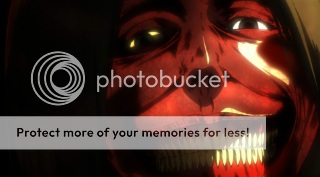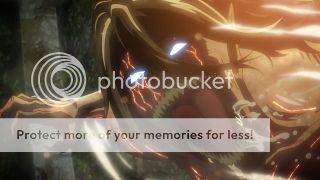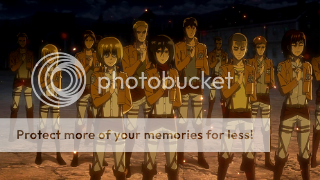Attack on What Now?!
…
*Ahem*
Attack on Titan!
Yeah, there’s no denying that this show’s become the newest, mainstream anime craze. Ever since Hajime Isayama’s Manga came out in 2009, the brand’s had enough of a cultural impact to warrant an anime series (of which the second season’s expected to hit next year, three years after the first season’s ratings caught Production I.G. off-guard), a live-action film, books, light-novels, fan-art, you name it, it’s happened. It’s even permeated the Western Hemisphere, so much so that it was on Netflix in subtitles long-before the dub officially aired on Toonami. That’s pretty impressive if you stop and think about it!
The question arising from this is, “Why?” What is it about this show that makes it so appealing? Why did it spread like wildfire, and why is it continuing to resonate years later? I have my theories, but before that I’ll shed some insight on what Attack on Titan’s all about.
The show takes place in a world where humanity is at odds with Titans. Titans are giant humanoids who devour humans for sport, although who created them is up for debate. The remnants of humanity banded together, formed walls and established ranks to combat these creatures should they break through. Our story follows Eren Jaeger, a kid who seeks revenge on said Titans when they break through the outer wall and devour his mother. He’s aided by his friends, a girl named Mikasa Ackerman and a boy named Armin Arlert, and decides to join The Survey Corps. However, it turns out that even amongst the humans there are dark secrets waiting to spill…
Oh, and for those about to yell “DUDE, SPOILERS!” over Eren’s mom being eaten…it’s no more a spoiler than Edward and Alphonse Elric losing limbs to alchemy while trying to bring back their mother in the Fullmetal Alchemist franchise. It’s a catalyst for the story.
As you’d expect, violence, carnage and death are big factors. The high death toll has warranted it comparisons to Game of Thrones, although how accurate that is remains debatable. Either way, Attack on Titan is, well, dramatic. It’s this dramatic touch that’s led detractors to criticize it for being “obnoxious” and “over-the-top”, accusing it of being “soap opera-esque”. Factor in being slow and dragging out its story for additional dramatic effect, and you have something as polarizing as it is popular.
Where do I stand on it?
For starters, I like the art-style. Yes, it’s a little rough. Yes, there are times where the background characters don’t move. Yes, the CGI can even be distracting. But, aside from that, the world of Attack on Titan is dark, grimy and grungy, all three of which fit it well. Add in its limited usage of Manga Iconography, and you’re left with a Shonen series that pushes the envelope of Shonen in ways I never thought possible.
I also like the clever use of direction. Tetsuro Araki has a history of adding a soap opera flair to everything he touches, apparent from his work on Death Note and High School of the Dead. His style teeters the fine line between obnoxious and sincere, making him hard to forget. Having given up on Death Note after 3 episodes due to how unsubtle and on-the-nose it was, you’d think I’d be burnt out on Attack on Titan early on. But I’m not. Araki’s over-the-top directing fits the material well, and I was willing to sit through its, admittedly, weirdly hammy and overblown shouting moments when they occurred.
It also helps that, amidst its hamminess, there’s a layer of depth to its character writing not present in the more lighthearted premises of most Shonen. That’s not to say the writing and dialogue are subtle, but they’re definitely nuanced. The themes of family and reacting to crises are really strong, and you understand the fear right from Episode 1. You get what’s at stake with Eren, or why Mikasa’s reliant on Eren, and it’s done with tact and complexity. Not to mention, there’s a lesbian relationship between two side-characters that’s openly implied, yet never doted on, which is great for gay fans.
The show’s also good at evoking pathos amidst fear. Whenever a Titan appears, it’s scary. Whenever a character is eaten by a Titan, it’s scarier. Admittedly, you know early on who won’t die, but even then the fake-outs are enough to get your heart pumping. And, of course, it’s all helped by the excellent direction by Araki!
So that’s where I stand on Attack on Titan. As for why it has such a big impact in the West, I think it boils down to two reasons, one superficial, the other more weighty:
Superficially, the show is creepy and dramatic, as it’s a story about people constantly fending off giant predators. This might not seem like a reason at all, until you consider that two of the biggest shows in the West currently, Game of Thrones and The Walking Dead, are also big because they cater to one of those two niches; Game of Thrones, on one hand, is a fantasy series about how awful it was to live in The Middle Ages. The Walking Dead, on the other hand, is an action series about surviving in a zombie apocalypse. In the former’s case, the show is drama with high violence and stakes. In the latter’s case, the show is horror with high violence and stakes. I know it’s stretching it to call Attack on Titan the love-child of these two shows, even though people are already doing that, but it definitely combines drama and horror to cater to both markets.
However, I think there’s a deeper reason for why this resonates. If you look at the aforementioned shows, they share a common link: well-written characters. This is especially important with The Walking Dead, as horror’s a genre where good character writing is essential for enjoyment. Other genres can get by on entertainment alone, but horror needs to be well-written and have compelling characters to be good. Add in that good horror in the West is rare now, as it’s become synonymous with bad acting and cheap jump scares, and it’s clear why Attack on Titan has made a dent.
Additionally, the show embodies two details about horror that help it resonate further. The first is tragedy, something every good horror film or show has an element of. Horror works on the basis that characters you’re attached to could be taken away at any minute, which is a scary thought. Add in family dynamics, the human desire to survive, even the human element in general, and you’re left with a terrifying premise. Especially since Attack on Titan plays to that.
The other detail is the struggle to survive. In his “Really That Good!” video on Ghostbusters, internet reviewer Moviebob mentions that the reason that film resonated so well with children, despite not originally being for them, is because it tapped into the fear of monsters and showed it could be overcome. Attack on Titan does the same, except from an adult’s perspective. Yes, the death toll is high, and yes, there’s that fear of being snuffed out at any moment. But that humanity is fighting back at all emphasizes the need for hope, something anyone can relate to.
There are other components driving the show, such as its music and the possible subtext of the food chain hierarchy, but in the end tragedy and survival are really what drive Attack on Titan and make it effective, especially to a Western audience. There are reasons to not like it, it’s slow, overdramatic and loves killing off characters for dramatic effect, but even then there’s more than enough to fill the void of a big hitter in the West. That’s also more than enough to bestow confidence in the second season...unless major plot details are spoiled again by the internet. (Seriously, screw you!)
*Ahem*
Attack on Titan!
Guren no Yumiya - Attack on Titan.
Yeah, there’s no denying that this show’s become the newest, mainstream anime craze. Ever since Hajime Isayama’s Manga came out in 2009, the brand’s had enough of a cultural impact to warrant an anime series (of which the second season’s expected to hit next year, three years after the first season’s ratings caught Production I.G. off-guard), a live-action film, books, light-novels, fan-art, you name it, it’s happened. It’s even permeated the Western Hemisphere, so much so that it was on Netflix in subtitles long-before the dub officially aired on Toonami. That’s pretty impressive if you stop and think about it!
The question arising from this is, “Why?” What is it about this show that makes it so appealing? Why did it spread like wildfire, and why is it continuing to resonate years later? I have my theories, but before that I’ll shed some insight on what Attack on Titan’s all about.
The show takes place in a world where humanity is at odds with Titans. Titans are giant humanoids who devour humans for sport, although who created them is up for debate. The remnants of humanity banded together, formed walls and established ranks to combat these creatures should they break through. Our story follows Eren Jaeger, a kid who seeks revenge on said Titans when they break through the outer wall and devour his mother. He’s aided by his friends, a girl named Mikasa Ackerman and a boy named Armin Arlert, and decides to join The Survey Corps. However, it turns out that even amongst the humans there are dark secrets waiting to spill…
Oh, and for those about to yell “DUDE, SPOILERS!” over Eren’s mom being eaten…it’s no more a spoiler than Edward and Alphonse Elric losing limbs to alchemy while trying to bring back their mother in the Fullmetal Alchemist franchise. It’s a catalyst for the story.
As you’d expect, violence, carnage and death are big factors. The high death toll has warranted it comparisons to Game of Thrones, although how accurate that is remains debatable. Either way, Attack on Titan is, well, dramatic. It’s this dramatic touch that’s led detractors to criticize it for being “obnoxious” and “over-the-top”, accusing it of being “soap opera-esque”. Factor in being slow and dragging out its story for additional dramatic effect, and you have something as polarizing as it is popular.
Where do I stand on it?
For starters, I like the art-style. Yes, it’s a little rough. Yes, there are times where the background characters don’t move. Yes, the CGI can even be distracting. But, aside from that, the world of Attack on Titan is dark, grimy and grungy, all three of which fit it well. Add in its limited usage of Manga Iconography, and you’re left with a Shonen series that pushes the envelope of Shonen in ways I never thought possible.
I also like the clever use of direction. Tetsuro Araki has a history of adding a soap opera flair to everything he touches, apparent from his work on Death Note and High School of the Dead. His style teeters the fine line between obnoxious and sincere, making him hard to forget. Having given up on Death Note after 3 episodes due to how unsubtle and on-the-nose it was, you’d think I’d be burnt out on Attack on Titan early on. But I’m not. Araki’s over-the-top directing fits the material well, and I was willing to sit through its, admittedly, weirdly hammy and overblown shouting moments when they occurred.
It also helps that, amidst its hamminess, there’s a layer of depth to its character writing not present in the more lighthearted premises of most Shonen. That’s not to say the writing and dialogue are subtle, but they’re definitely nuanced. The themes of family and reacting to crises are really strong, and you understand the fear right from Episode 1. You get what’s at stake with Eren, or why Mikasa’s reliant on Eren, and it’s done with tact and complexity. Not to mention, there’s a lesbian relationship between two side-characters that’s openly implied, yet never doted on, which is great for gay fans.
The show’s also good at evoking pathos amidst fear. Whenever a Titan appears, it’s scary. Whenever a character is eaten by a Titan, it’s scarier. Admittedly, you know early on who won’t die, but even then the fake-outs are enough to get your heart pumping. And, of course, it’s all helped by the excellent direction by Araki!
So that’s where I stand on Attack on Titan. As for why it has such a big impact in the West, I think it boils down to two reasons, one superficial, the other more weighty:
Superficially, the show is creepy and dramatic, as it’s a story about people constantly fending off giant predators. This might not seem like a reason at all, until you consider that two of the biggest shows in the West currently, Game of Thrones and The Walking Dead, are also big because they cater to one of those two niches; Game of Thrones, on one hand, is a fantasy series about how awful it was to live in The Middle Ages. The Walking Dead, on the other hand, is an action series about surviving in a zombie apocalypse. In the former’s case, the show is drama with high violence and stakes. In the latter’s case, the show is horror with high violence and stakes. I know it’s stretching it to call Attack on Titan the love-child of these two shows, even though people are already doing that, but it definitely combines drama and horror to cater to both markets.
However, I think there’s a deeper reason for why this resonates. If you look at the aforementioned shows, they share a common link: well-written characters. This is especially important with The Walking Dead, as horror’s a genre where good character writing is essential for enjoyment. Other genres can get by on entertainment alone, but horror needs to be well-written and have compelling characters to be good. Add in that good horror in the West is rare now, as it’s become synonymous with bad acting and cheap jump scares, and it’s clear why Attack on Titan has made a dent.
Additionally, the show embodies two details about horror that help it resonate further. The first is tragedy, something every good horror film or show has an element of. Horror works on the basis that characters you’re attached to could be taken away at any minute, which is a scary thought. Add in family dynamics, the human desire to survive, even the human element in general, and you’re left with a terrifying premise. Especially since Attack on Titan plays to that.
The other detail is the struggle to survive. In his “Really That Good!” video on Ghostbusters, internet reviewer Moviebob mentions that the reason that film resonated so well with children, despite not originally being for them, is because it tapped into the fear of monsters and showed it could be overcome. Attack on Titan does the same, except from an adult’s perspective. Yes, the death toll is high, and yes, there’s that fear of being snuffed out at any moment. But that humanity is fighting back at all emphasizes the need for hope, something anyone can relate to.
There are other components driving the show, such as its music and the possible subtext of the food chain hierarchy, but in the end tragedy and survival are really what drive Attack on Titan and make it effective, especially to a Western audience. There are reasons to not like it, it’s slow, overdramatic and loves killing off characters for dramatic effect, but even then there’s more than enough to fill the void of a big hitter in the West. That’s also more than enough to bestow confidence in the second season...unless major plot details are spoiled again by the internet. (Seriously, screw you!)






Comments
Post a Comment